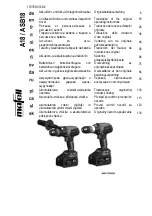
Grilling Guide
Follow these guidelines for successful grilling:
1
Set the temperature control dial to the desired temperature.
Preheat the grill until the READY arrow light goes out, approximately
10 minutes.
2
Marinate meats before grilling for extra flavor and tenderness, if
desired. (Marinades with added sugar will cause meats to brown
more quickly.)
3
Before grilling, partially cook bone-in chicken, ribs and uncooked
smoked or fresh sausages for best results. If not partially cooked,
these meats may become overbrowned on the outside before the
center is done.
4
Turn food once during grilling unless otherwise directed.
5
If desired, brush with barbecue or other sauce during last 5 to 10
minutes of grilling.
6
Unplug from outlet and allow grill to cool completely before
disposing of drippings that have accumulated in the drip channel.
10
Grilling Chart
Meat
Time/Temp. Doneness Test
Helpful Hints
BEEFSTEAKS
1” thick
10 - 15 min.
Medium rare - 145˚
Slash fat around edge to prevent
3 ⁄4” thick
MAX
Medium - 160˚
curling (avoid cutting into meat).
Well done - 170˚
BURGERS
(3 ⁄4” thick)
Hamburgers
14 - 16 min.
Medium (160°) or
400°
Until no longer pink
Turkey burgers
15 - 20 min.
in center
400°
PORK CHOPS
Rib and loin
10 - 12 min.
Until slightly pink
Slash fat around edge to prevent
1 ⁄ 2” thick
12 - 15 min.
in center or 160°.
curling (avoid cutting into meat).
3 ⁄4” thick
12 - 15 min.
350°
Grilling Tips
1
The nonstick cooking surface is metal utensil safe. However care
should be taken when using metal utensils with this product. Only
use the enclosed scraper to clean the griddle
2
Be careful not to transfer germs from raw meat to cooked meat.
Use separate utensils and platters for raw and cooked meat or wash
platter used for raw meat before placing cooked meat on it.
3
Use a long-handled brush for basting foods during grilling.
4
Tender meat cuts, such as sirloin and tenderloin, are generally
more suitable for grilling than less-tender meat cuts, such as round
or rump.
5
Many less-tender meat cuts can be grilled, but they benefit from the
tenderizing effects of marinating in an acid-based wet marinade.
6
A marinade is a seasoned mixture (wet or dry) in which foods are
soaked in order to absorb flavor and/or become more tender. The
flavor grows stronger the longer the marinade is left on the food
before cooking. The amount of time usually ranges from 1 hour to
24 hours.
A wet marinade usually consists of oil (vegetable or olive) to give
moisture, an acid (lemon juice, vinegar, wine, tomatoes or yogurt)
to tenderize, and flavorings (herbs and spices) to enhance or
add flavor.
A dry marinade, or spice rub, is a mixture of herbs, spices and salt
that is rubbed onto the food after the food has been lightly brushed
with vegetable oil. Generally, use 1 to 2 tablespoons dry marinade
per pound of meat.
7
Always marinate in a tightly covered nonmetal dish, and turn the
food occasionally. Be sure to refrigerate all meats while marinating.
Heavy plastic bags are also convenient for marinating – add the food
and marinade, then tightly seal the bag. Turn the bag now and then
to redistribute the marinade.
8
If leftover wet marinade is to be used as a sauce with the cooked
food, be sure to place it in a small pan and heat it to a rolling boil
before serving to eliminate any bacterial growth.
9
Grease from high fat foods, such as bacon or sausage, may splatter
on countertop. Protect countertop as necessary.
10
When grilling fish, use a large flat spatula or turner to turn the fish.
9






































